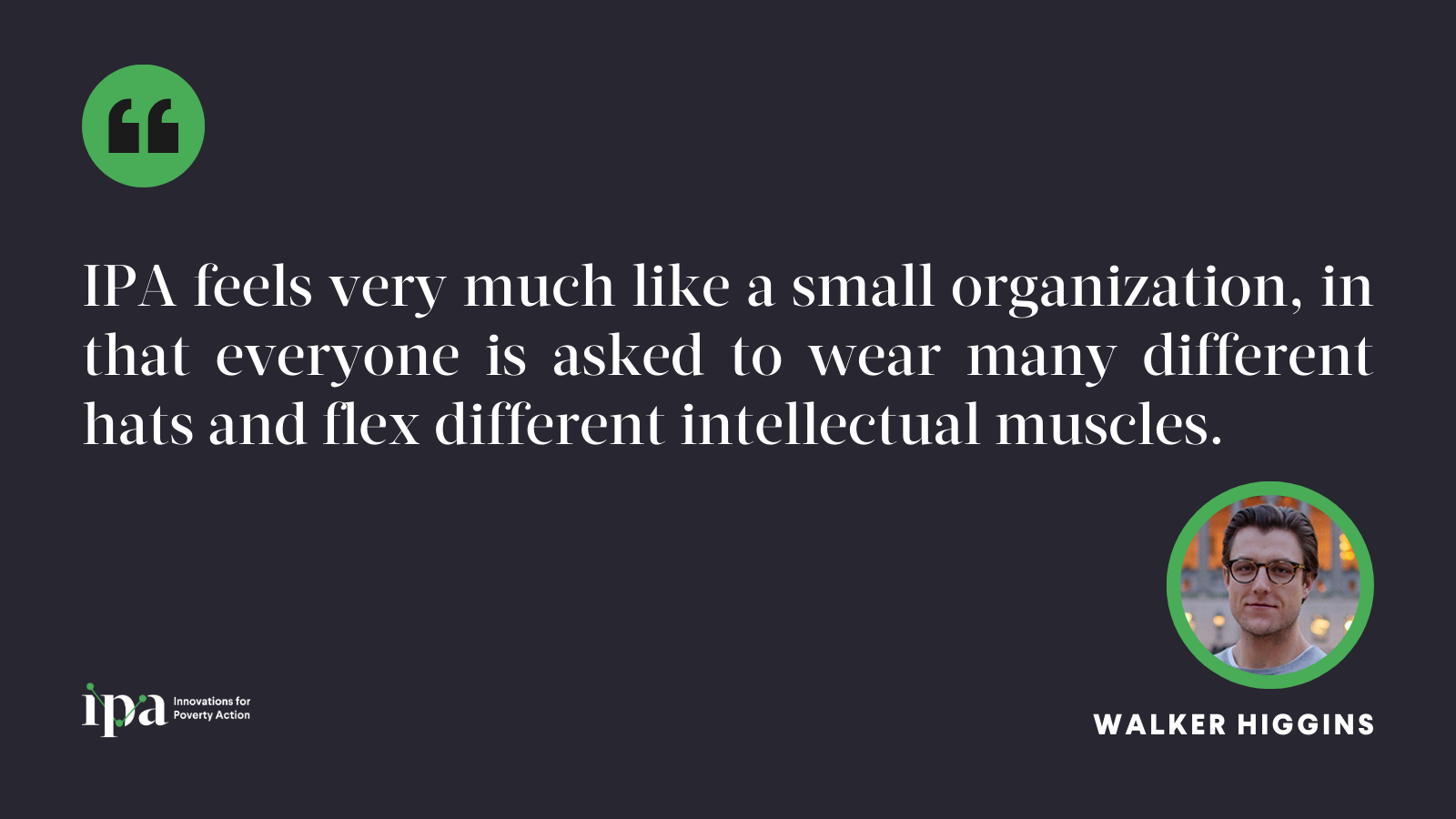Walker Higgins: Everyone is Asked to Wear Many Different Hats
This blog is part of a series of IPA staff sharing insights from their work. Read other blogs in this series from Tanvi Jaluka, Financial Inclusion Program Manager; and Peter Srouji, Associate Director of Program Development.
To mark its 20th anniversary, Innovations for Poverty Action created People of IPA, a series of profiles celebrating IPA’s diverse staff, highlighting their contributions, and discussing how and why they seek to improve the lives of those living in poverty. Walker Higgins is the Country Director of IPA's Liberia and Sierra Leone offices.
Reading the right words at the right time can change a life. “The book Poor Economics by Esther Duflo was the reason why I pivoted my career away from the private sector and towards international development,” says Walker. He had studied economics and statistics, and went on to roles in corporate retail and private equity, among other fields. He was successful and made close, valued friends, but something was missing. The book brought it into focus.
He wanted work that felt more meaningful.
With her MIT colleague and co-author Abhjit Banerjee, Duflo argues in Poor Economics for a new approach to poverty alleviation, one that uses randomized controlled trials and observation to reveal which development interventions create real impact. That method became the cornerstone of IPA’s research model.
Walker was intrigued.
“I was not really feeling satisfied in my job,” he says. “So I wanted to do something that I felt was more useful to the world—and more fulfilling.”
“IPA was always an organization that I respected and was interested in. I knew a lot of very capable, intelligent people who worked for them, who would vouch for the organization’s strengths,” he says. “So when the opportunity presented itself, I jumped at it.”
Walker started as the research manager for IPA’s Liberia office, handling a broad range of duties. He was “primarily focused on making sure that the projects that we were doing function as they should,” he says, ensuring “that we’re doing high-quality research and we’re not spending too much money,” as well as following ethical and regulatory guidelines.
About a year later, his role expanded to country manager for both Sierra Leone and Liberia. “So not only was I folding more responsibilities into my job description,” he says, but “then also folding an entire new country into that, which was a bit of a transition.”
To Walker, “IPA feels very much like a small organization, in that everyone is asked to wear many different hats and flex different intellectual muscles.” Among the hats he’s worn: research and statistics, management, finance, communications, project development, and working with external stakeholders.

He finds the variety stimulating, but acknowledges that taking on so many new duties at once can be challenging, “because you're forced to go out of your comfort zone.”
Still, such challenges can have benefits. “I think that's when people grow and develop professionally and individually, which has been my experience,” he says, “and I think that's been shared by many others within the organization.”
Growth is just one thing that makes the job rewarding for Walker. Another is his colleagues.
“IPA is filled with a lot of people who are really passionate, really smart. They care about their job and care about the work that we're doing. They believe in the mission,” he says. He knows that many could be earning higher salaries in the private sector, but have chosen humanitarian work instead.
To him, that kind of commitment sets IPA apart. It’s a place “where people are actively choosing to be most of the time when they have other options available,” he says. “They come with very particular skills, and they're choosing to come to a place where they feel, and I would agree, that they can make a true, positive impact in the world.”












